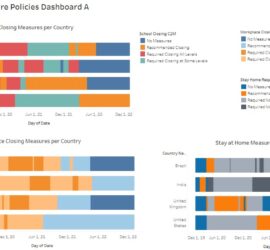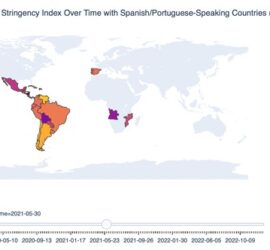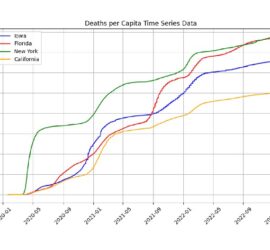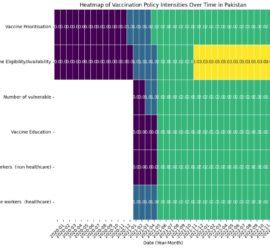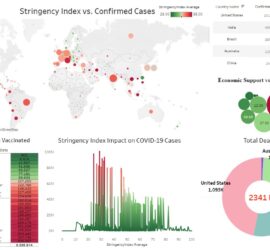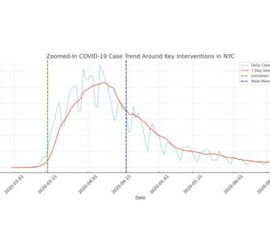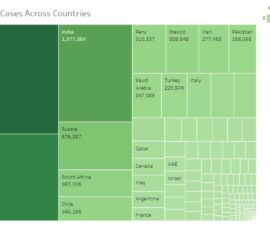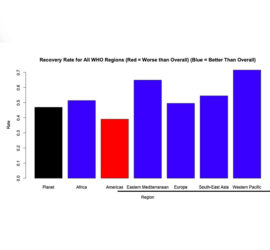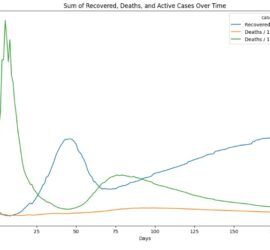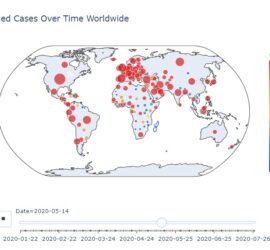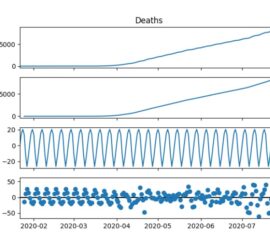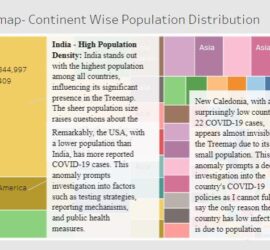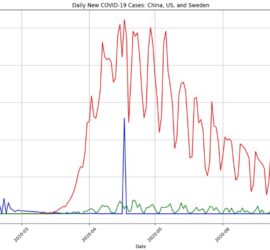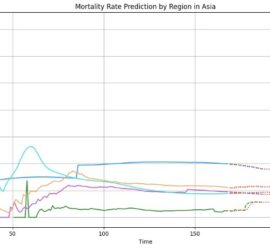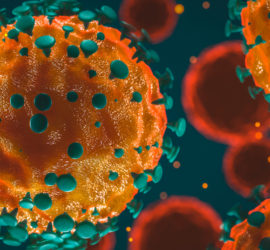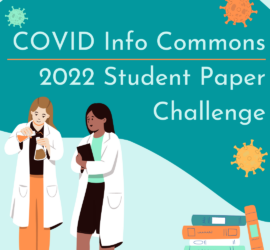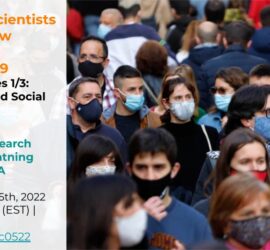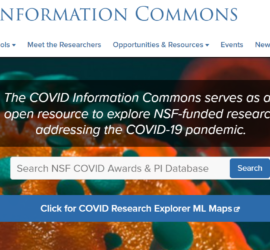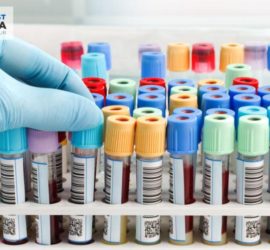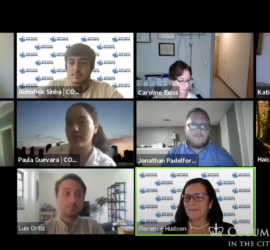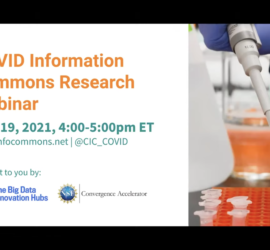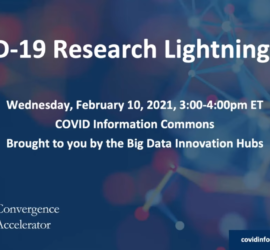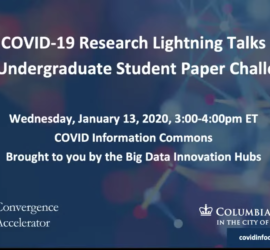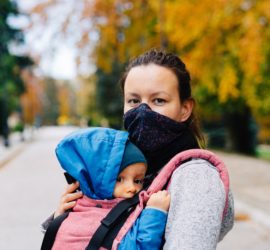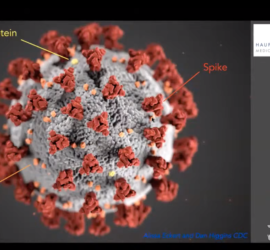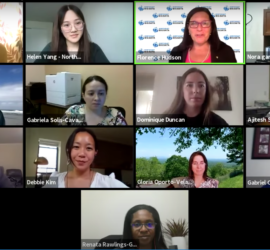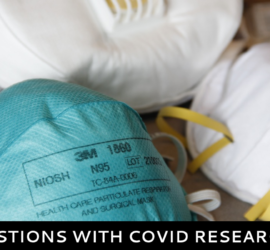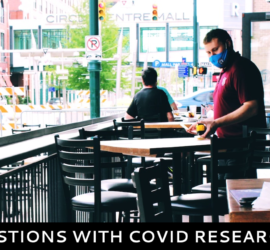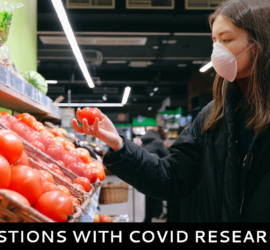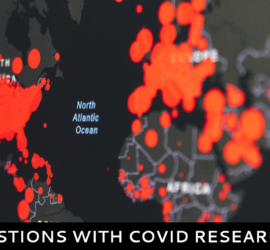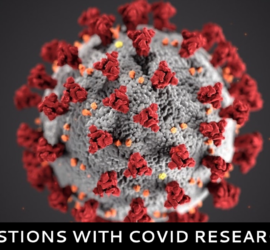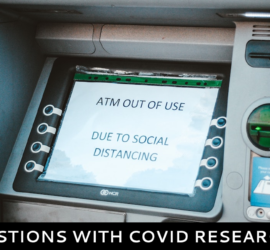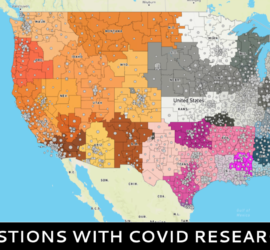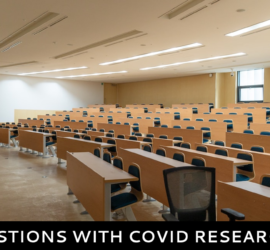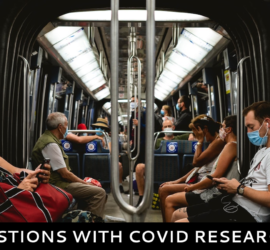COVID Information Commons
Kaushik Patil, Aarushi Tuli: Spring 2024 Analyzing Pandemic Responses (APR) Project
In February 2024, the CIC Student Working Group launched a data science project on global responses to the COVID-19 pandemic. The 575+ members of the Student Working Group developed independent research analyses, practicing data science, machine learning, time series analysis, and geospatial mapping along the way. We learned to develop […]
Ethan Sonnenreich: Spring 2024 Analyzing Pandemic Responses (APR) Project
In February 2024, the CIC Student Working Group launched a data science project on global responses to the COVID-19 pandemic. The 575+ members of the Student Working Group developed independent research analyses, practicing data science, machine learning, time series analysis, and geospatial mapping along the way. We learned to develop […]
Keaton Hereid, Kenny Mark: Spring 2024 Analyzing Pandemic Responses (APR) Project
In February 2024, the CIC Student Working Group launched a data science project on global responses to the COVID-19 pandemic. The 575+ members of the Student Working Group developed independent research analyses, practicing data science, machine learning, time series analysis, and geospatial mapping along the way. We learned to develop […]
Saad Khan: Spring 2024 Analyzing Pandemic Responses (APR) Project
In February 2024, the CIC Student Working Group launched a data science project on global responses to the COVID-19 pandemic. The 575+ members of the Student Working Group developed independent research analyses, practicing data science, machine learning, time series analysis, and geospatial mapping along the way. We learned to develop […]
Sindhuja Achutuni, Cheemakurthy Navaneeth Kumar, Eslin Kiran Ilangovan, Ramya Madugula: Spring 2024 Analyzing Pandemic Responses (APR) Project
In February 2024, the CIC Student Working group launched a data science project on global responses to the COVID-19 pandemic. The 575+ members of the Student Working Group developed independent research analyses, practicing data science, machine learning, time series analysis, and geospatial mapping along the way. We learned to develop […]
Sanket Bhandari & Varalika Mahajan: Fall 2023 COVID Information Commons Student Working Group Data Visualization Project
In October 2023, the CIC Student Working group launched our first semester-long data science education project on COVID-19 Visualization. The 300+ members of the Working Group developed independent data visualizations using tools and skills learned as a community. We learned to develop a COVID-19 research question and explored time series analysis […]
Christopher Sanchez: Fall 2023 COVID Information Commons Student Working Group Data Visualization Project
In October 2023, the CIC Student Working group launched our first semester-long data science education project on COVID-19 Visualization. The 300+ members of the Working Group developed independent data visualizations using tools and skills learned as a community. We learned to develop a COVID-19 research question and explored time series analysis […]
Sahand Ahmadi: Fall 2023 COVID Information Commons Student Working Group Data Visualization Project
In October 2023, the CIC Student Working group launched our first semester-long data science education project on COVID-19 Visualization. The 300+ members of the Working Group developed independent data visualizations using tools and skills learned as a community. We learned to develop a COVID-19 research question and explored time series analysis […]
Jared De La Serna: Fall 2023 COVID Information Commons Student Working Group Data Visualization Project
In October 2023, the CIC Student Working group launched our first semester-long data science education project on COVID-19 Visualization. The 300+ members of the Working Group developed independent data visualizations using tools and skills learned as a community. We learned to develop a COVID-19 research question and explored time series analysis […]
Hangqi Wu: Fall 2023 COVID Information Commons Student Working Group Data Visualization Project
In October 2023, the CIC Student Working group launched our first semester-long data science education project on COVID-19 Visualization. The 300+ members of the Working Group developed independent data visualizations using tools and skills learned as a community. We learned to develop a COVID-19 research question and explored time series analysis […]
Li-Yung Wang: Fall 2023 COVID Information Commons Student Working Group Data Visualization Project
In October 2023, the CIC Student Working group launched our first semester-long data science education project on COVID-19 Visualization. The 300+ members of the Working Group developed independent data visualizations using tools and skills learned as a community. We learned to develop a COVID-19 research question and explored time series analysis […]
Sisan Tuedor: Fall 2023 COVID Information Commons Student Working Group Data Visualization Project
In October 2023, the CIC Student Working group launched our first semester-long data science education project on COVID-19 Visualization. The 300+ members of the Working Group developed independent data visualizations using tools and skills learned as a community. We learned to develop a COVID-19 research question and explored time series analysis […]
Scott Ren: Fall 2023 COVID Information Commons Student Working Group Data Visualization Project
In October 2023, the CIC Student Working group launched our first semester-long data science education project on COVID-19 Visualization. The 300+ members of the Working Group developed independent data visualizations using tools and skills learned as a community. We learned to develop a COVID-19 research question and explored time series analysis […]
Minh Le, Diep Le, Huy Nguyen: Fall 2023 COVID Information Commons Student Working Group Data Visualization Project
In October 2023, the CIC Student Working group launched our first semester-long data science education project on COVID-19 Visualization. The 300+ members of the Working Group developed independent data visualizations using tools and skills learned as a community. We learned to develop a COVID-19 research question and explored time series analysis […]
Fall 2023 CIC Webinar Recap
The twenty-seventh of the COVID Information Commons (CIC) webinar series took place on October 10, 2023. In this forum, leading COVID-19 scientists presented their current research on the global pandemic. Event moderators included Florence Hudson, Executive Director of the Northeast Big Data Innovation Hub at Columbia University and COVID Information Commons Principal Investigator (PI), Lauren […]
Summer 2023 CIC Webinar Recap
The fourteenth session of the COVID Information Commons (CIC) webinar series took place on July 26th, 2023. In this forum, leading COVID-19 scientists presented their current research on the global pandemic. Event moderators included Florence Hudson, Executive Director of the Northeast Big Data Innovation Hub at Columbia University and COVID Information Commons Principal Investigator […]
Spring 2023 CIC Webinar Recap
The thirteenth in the series of COVID Information Commons (CIC) webinars which began in 2020 took place on April 24th, 2023. In this forum, leading COVID-19 scientists presented their current research on the global pandemic. Event moderators included Florence Hudson, Executive Director of the Northeast Big Data Innovation Hub at Columbia University and COVID […]
The Covid Information Commons & Columbia University Libraries – using translation & transcription to increase accessibility to NSF-funded research
by Lauren Close, Lylybell Teran, and Esther Jackson, with editorial support from Florence Hudson, Macy Moujabber, Isabella Graham-Martinez, and Jeremiah Mercurio With thanks to Lara Azar, Elia Bregman, Brian Buckley, Cora Lee Cole, Victoria Horrocks, Saanya Subasinghe, Rhyley Vaughan, and Kathryn Pope. As our scholarly communication ecosystem becomes increasingly reliant on digital […]
January 2023 CIC Webinar Recap
The twelfth in the series of COVID Information Commons (CIC) webinars which began in 2020 took place on January 31st, 2023. In this forum, leading COVID-19 scientists presented their current research on the global pandemic. Event moderators included Florence Hudson, Executive Director of the Northeast Big Data Innovation Hub at Columbia University and COVID […]
COVID Information Commons: Lightning Talks (July 2022)
The COVID Information Commons (CIC) webinar took place on July 15th, 2022. In this forum, leading COVID-19 scientists presented their current research on the global pandemic. Event moderators included Florence Hudson, Executive Director of the Northeast Big Data Innovation Hub at Columbia University and COVID Information Commons Principal Investigator (PI), and Lauren Close, […]
Knowledge Graph Embedding Evolution for COVID-19
Guest post by Dr. Steven Skiena, Stony Brook University This Success Story is a report on the results of the Northeast Big Data Innovation Hub’s 2020 Seed Fund program. Steven Skiena and Xingzhi Guo presented this research to the COVID Information Commons (CIC) community as part of the February 2022 […]
CritCOVIDView: A Critical Care Visualization Tool for COVID-19
Guest post by Dr. Todd Brothers, University of Rhode Island This Success Story is a report on the results of the Northeast Big Data Innovation Hub’s 2020 Seed Fund program. The main goal of this project was to develop a cutting-edge tool, CritCOVIDView, for bedside clinicians interpreting individualized patient data […]
COVID Information Commons: Lightning Talks (June 2022)
The June 2022 COVID Information Commons (CIC) webinar took place on June 10th, 2022. In this forum, leading COVID-19 scientists funded by NSF presented their current research on the global pandemic. Event moderators included Florence Hudson, Executive Director of the Northeast Big Data Innovation Hub at Columbia University and COVID Information Commons Principal […]
COVID Information Commons: Lightning Talks (April 2022)
The April 2022 COVID Information Commons (CIC) webinar took place on April 15th, 2022. In this forum, leading COVID-19 scientists funded by the NSF presented their current research on the global pandemic. Florence Hudson, Executive Director of the Northeast Big Data Innovation Hub at Columbia University and COVID Information Commons […]
COVID Information Commons: Lightning Talks (May 2022)
The May 2022 COVID Information Commons (CIC) webinar took place on May 5th, 2022. In this forum, leading COVID-19 scientists funded by the NSF presented their current research on the global pandemic. Florence Hudson, Executive Director of the Northeast Big Data Innovation Hub at Columbia University and COVID Information Commons […]
COVID Information Commons: Lightning Talks (March 2022)
Guest Post: Kenia Pujols Keywords: Pandemic, virtual reality, health, data science, mandates, government, collaboration, diagnostics, depression, social isolation, learning, COVID-19. A recording of this event is available on the Northeast Big Data Innovation Hub’s YouTube Channel and the COVID Information Commons website at covidinfocommons.net. The COVID Information Commons is an […]
Contact patterns during the 2020 COVID-19 epidemic
Guest post by Dr. Eli Fenichel, Yale University This Success Story is a report on the results of the Northeast Big Data Innovation Hub’s 2020 Seed Fund program. The goal of the project was to bring together mathematics, data science, economic epidemiology, and public health, contributing to all fields by […]
COVID Information Commons: Lightning Talks (February 2022)
Post Guest: Haleigh Stewart Four NSF-funded researchers convened on Friday, February 4th, 2022 at the COVID-19 Research Webinar Lightning Talk, marking the 17th event of the webinar series. Organized through the COVID Information Commons (CIC), the COVID-19 Research Webinar series fosters collaboration across different disciplines and provides a virtual platform […]
COVID Information Commons: Lightning Talks (January 2022)
Guest Post: Kenia Pujols Keywords: Pandemic, STEM, structural biology, crystallography, MARCO polo, COVID-ARC, bibliometrics, health, data science, collaboration, archive, COVID-19. A recording of this event is available at the Northeast Big Data Hub’s YouTube Channel and covidinfocommons.net. The COVID Information Commons is a NSF-funded project brought to you by the […]
COVID Information Commons: Lightning Talks (November 2021)
Guest Post: Saanya Subasinghe A recording of this event is available at the Northeast Big Data Hub’s YouTube channel as well as at covidinfocommons.net. The COVID Information Commons is an NSF-funded project brought to you by the Big Data Innovation Hubs, led by the Northeast Big Data Innovation Hub at […]
COVID Information Commons: Lightning Talks (October 2021)
Guest Post: Isabella Graham Martinez A recording of this event is available at the Northeast Big Data Hub’s YouTube channel as well as at covidinfocommons.net. The COVID Information Commons is an NSF-funded project brought to you by the Big Data Innovation Hubs, led by the Northeast Big Data Innovation Hub […]
National Science Foundation (NSF) Awards $2 Million for COVID Information Commons Extension for Pandemic Recovery (CIC-E)
New York, NY – October 5, 2021 The COVID Information Commons (CIC) project, a program led by the Northeast Big Data Innovation Hub in the Data Science Institute at Columbia University, in collaboration with the Midwest Big Data Innovation Hub, the South Big Innovation Data Hub, and the West Big […]
COVID Information Commons: Lightning Talks (September 2021)
Guest post: Brian Buckley, Boston University; Volunteer, Northeast Big Data Innovation Hub On Wednesday, September 22, 2021, six researchers studying a wide range of topics on the global pandemic presented their work as part of the ongoing COVID-19 Research Webinar series organized through the COVID Information Commons (CIC). The COVID […]
COVID Information Commons: Lightning Talks (August 2021)
Guest post: Brian Buckley, Boston University; Volunteer, Northeast Big Data Innovation Hub On Wednesday, August 18, 2021, five researchers studying a wide range of topics on the global pandemic presented their work as part of the ongoing COVID-19 Research Webinar series organized through the COVID Information Commons (CIC). The COVID Information Commons is […]
COVID Information Commons: Lightning Talks (July 2021)
On Friday, July 16th, 2021, five researchers studying a wide range of topics on the global pandemic presented their work as part of the ongoing COVID-19 Research Webinar series organized through the COVID Information Commons (CIC). The COVID Information Commons is an NSF-funded project organized by the Big Data Innovation […]
COVID Information Commons: Lightning Talks (June 2021)
Watch the full webinar here. On Wednesday, June 9, 2021, six researchers studying wide-ranging aspects of the current pandemic came together as a part of the ongoing COVID-19 Research Webinar series organized through the COVID Information Commons, to share their research and insights with our community. This month’s event featured […]
COVID Information Commons: Lightning Talks (May 2021)
Watch the full webinar here. On Wednesday, May 19 2021, five researchers studying wide-ranging aspects of the current pandemic came together as a part of the ongoing COVID-19 Research Webinar series organized through the COVID Information Commons, to share their research and answer questions from our community. This month’s event […]
Chocolate to Reduce COVID Spread? Researchers Discuss Their Work in February Webinar
During February’s COVID Information Commons (CIC) webinar, researchers, students, and non-profit leaders gathered to discuss and collaborate on research about COVID. The webinar featured talks from seven scientists from across the nation who shared insights on their NSF-funded research. Speakers included Naomi Senehi from Rice University, Nicola Sochacka from the […]
2021 Kicks off with New Insights by COVID-19 Researchers and the Undergraduate Student Paper Challenge
On Wednesday, January 13, 2021, seven scientists from across the nation joined us as part of the ongoing COVID-19 Research Webinar series organized through the COVID Information Commons. During the event, each researcher shared their work, providing new insights regarding the global pandemic and revealed some of the unexpected implications […]
Announcement of Student Paper Challenge and shared insights amongst COVID-19 researchers at the December COVID Information Commons webinar
Over 80 people convened for this month’s COVID webinar, as six NSF Rapid Response Research investigators from across the United States shared their research topics and findings regarding the COVID-19 pandemic, and the new COVID Information Commons Student Paper Challenge was announced. This month’s presenters included Foad Hamidi (University of […]
COVID-19 researchers share insights at the November COVID Information Commons webinar.
This month’s Covid Information Commons (CIC) webinar brought together researchers, students and leaders in nonprofits. The CIC serves as a platform for researchers and scientists to share knowledge and collaborate on research about COVID. This month, the CIC project team announced the launch of a new feature at covidinfocommons.net: the […]
Researchers share new insights and opportunities for collaboration at October’s COVID Information Commons Webinar
Eight scientists spoke with an enthusiastic community at the second COVID-19 Research Webinar organized by the COVID Information Commons on October 16, 2020. Presenters who shared their latest research findings regarding the current pandemic included Rachel Wu (University of California-Riverside), Sara Rampazzi (University of Michigan), Sarah Bowman (Hauptman-Woodward Medical Research […]
Researchers studying COVID-19 share insights at first COVID Information Commons Community webinar
“Your site and the ability to come together is marvelous. I thank you especially for thinking about this and bringing us together. People will be able to use your site as a proper, safe, true information source.”
5 Questions with COVID Researchers: Cassandra Thiel, New York University
The COVID-19 pandemic has had a significant impact on the US food supply network. Supply chains that were very efficient in meeting the needs of restaurants and supermarkets have had a hard time adapting to changing conditions.
5 Questions with COVID Researchers: Tracy Van Holt, New York University
The COVID-19 pandemic has had a significant impact on the US food supply network. Supply chains that were very efficient in meeting the needs of restaurants and supermarkets have had a hard time adapting to changing conditions.
5 Questions with COVID Researchers: Debra Laefer, New York University
We tried to understand to what extent people coming from a COVID-19-infected environment interact with the built and natural environment. Specifically, we wanted to understand in three dimensions what people touched, how much they touched, and where they went coming out of hospitals and urgent care facilities at the peak of the COVID-19 outbreak.
5 Questions with COVID Researchers: Bernhard Leidner, University of Massachusetts Amherst
Our research examines and compares people’s compliance with these measures over time, across diverse national, cultural, and political contexts. Specifically, it focuses on how different value and belief systems influence (non)compliance with containment measures as the pandemic unfolds.
5 Questions with COVID Researchers: Sarah Bowman, Hauptman-Woodward Medical Research Institute
Understanding the structures of the SARS-CoV-2 viral proteins is essential to understanding its biology, its infectiousness, its transmissibility, and how to develop treatments for it. Our project focuses on enabling the process of structure determination for SARS-CoV-2 proteins.
5 Questions with COVID Researchers: Amy Pickering, Tufts University
The role of contaminated surfaces (fomites) in community transmission of SARS-CoV-2 has been debated. Our team is sampling high-touch public surfaces during the ongoing pandemic to improve understanding of the risk of SARS-CoV-2 infection when the public accesses essential businesses such as grocery stores, pharmacies, and gas stations.
5 Questions with COVID Researchers: Leila Hedayatifar, New England Complex Systems Institute
Modeling COVID-19 in the context of optimizing quarantine policy using mobility patterns
5 Questions with COVID Researchers: John Dennehy, Queens College, CUNY
We are attempting to apply approaches developed in microbial ecology to understand how a viral pathogen such as SARS-CoV-2 can survive and be transmitted in academic environments.
5 Questions with COVID Researchers: Ramesh Raskar, Massachusetts Institute of Technology
We are designing a public health solution for contact tracing built around digital ecosystems. Our current focus is on improving privacy, user-experience, effectiveness, and adoption of digital contact tracing. With so many issues at forefront, the challenge to solve the contact tracing puzzle is manifold.


